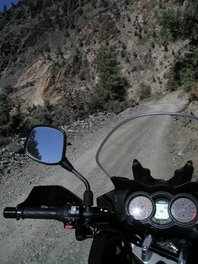



The storm and its fury rage today,
Crushing hope that we cherished so dear,
Storm and clouds will in time pass away,
The sun again will shine bright and clear.
-from "Keep on the Sunny Side" as recorded by Hank Williams.
The hopes of the McMullin family of California's northern coast in the late 1880's were indeed crushed, one by one. I have visited their graves repeatedly over the past 20 years passing through the area. The stones show how their toddlers were born and buried one after the other until, eventually, sooner rather than later, the parents go to join them leaving, apparently, no issue.
The family lies in Evergreen Cemetery [a few steps away from 38.9505N, 123.6904W on GPS or Google Earth] at the intersection of Highway One and Mountain View Road just south of Manchester, California. South lie the Garcia River and Point Arena, a larger village. Graves here appear to bear only Anglo names, many of them appearing on local landmarks, ranches, or street names. Two cemeteries close by Point Arena, one with the same name as the Catholic church in town, the other with the Odd Fellows sign above its large concrete gateway, show more diversity, including graves of the Stornettas, whose name is carried by North Coast icon Clover Stornetta Dairies. The Stornettas' land is visible from Evergreen Cemetery.
No concrete gateway or white picket fence borders Evergreen. A cedar windbreak forms the entry. The fence is split cedar stake, typical to the area. The turf is short, but not mown. The McMullins lie in the open area near the entrance where one of several shorter conifers passes its shadow over the stones as the day's sun moves by. Further back in the cemetery, the trees that grow thick over the bordering streambed encroach on neglected graves at the back. One exception is a 10' x 10' concrete area where several members of the Bishop family were interred in the century before last. The name pops up all over the cemetery and on [at least historically] the ranch just up Mountain View Road.
Under the shade of a tree blown hard by coastal winds, the parents' somewhat monumental gravestone is the final punctuation of a short sentence of much simpler gravestones. The small stones are regularly spaced and mostly straight, like a first-grader's new teeth. Here we see the fruit of Jennie McMullin's womb, beginning when she is 25 years old. Her partner, presumably husband, was 20 years her senior.
The first of the stone incisors is for Carl, "Son of S.W. & Jennie McMullin". The stone notes that he died 25 days after his 1st birthday in 1874. In the next year, his brother, a little over a month old, dies. 2 years later they are followed into life, and then into death, by Irene, "Dau. of" the same parents, nearly a year old. This mother, who can least bear an extra burden, then conceives twins. Less than a year after the death of Irene, one, Ellie, dies on the day she is born. The other, Paullie, survives. For a week. The twins bear names befitting infants. They will not need adult names. Nearly three years elapse before the McMullins' final attempt at reproduction arrives at Evergreen Cemetery. In November 1880, their unnamed "Dau" is interred. No date of birth is listed. "Infant" reads the headstone. Jennie's reproductive potential is exhausted. She is just 31. Perhaps they have learned not to name their dying children. Perhaps this was a miscarried pre-term foetus.
The side of the adult McMullins' large, substantial gravestone lists all of these children, and no more. Jennie McMullins survived until 1893. She was 44. Her husband did not see two more summers after her death.


No comments:
Post a Comment